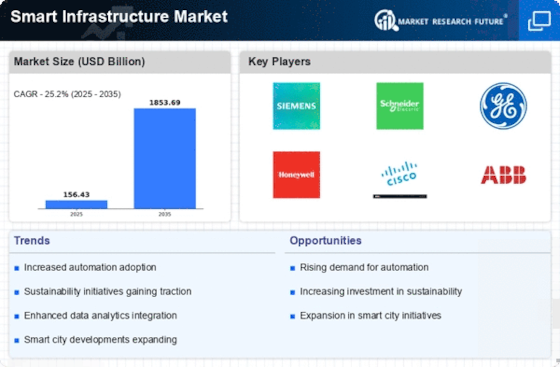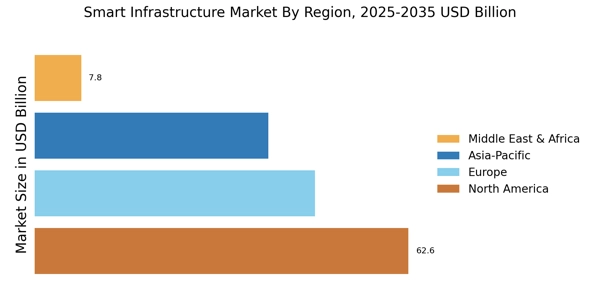The Smart Infrastructure Market is currently characterized by a dynamic competitive landscape, driven by rapid technological advancements and an increasing emphasis on sustainability. Siemens Smart Infrastructure plays a pivotal role in the global market by delivering integrated digital solutions for energy systems, buildings, and cities. Compared to competitors of Siemens, the company maintains a strong position through its focus on automation, electrification, and smart city platforms. Siemens infrastructure and cities strategy emphasizes sustainable urban development and intelligent automation. Leading intelligent automation companies, including Siemens and ABB, are integrating AI-driven solutions into smart infrastructure systems.
Key players such as Siemens (Germany), Schneider Electric (France), and General Electric (United States) are at the forefront, each adopting distinct strategies to enhance their market positioning. Siemens (Germany) focuses on digital transformation and smart building technologies, aiming to integrate IoT solutions into urban infrastructure. Schneider Electric (France) emphasizes sustainability and energy efficiency, leveraging its expertise in energy management to cater to the growing demand for green solutions. General Electric (United States) is concentrating on industrial IoT and predictive maintenance, which enhances operational efficiency across various sectors. Collectively, these strategies not only shape the competitive environment but also drive innovation and responsiveness to market demands.In terms of business tactics, companies are increasingly localizing manufacturing and optimizing supply chains to enhance resilience and responsiveness. The Smart Infrastructure Market appears moderately fragmented, with a mix of established players and emerging startups. The collective influence of key players is significant, as they engage in strategic partnerships and collaborations to bolster their capabilities and expand their market reach.
In August Siemens (Germany) announced a partnership with a leading tech firm to develop advanced AI-driven solutions for smart cities. This collaboration is poised to enhance urban infrastructure management, enabling cities to optimize resource allocation and improve service delivery. The strategic importance of this move lies in Siemens' commitment to integrating cutting-edge technology into its offerings, thereby reinforcing its leadership in the smart infrastructure domain.
In September Schneider Electric (France) launched a new suite of energy management tools aimed at small and medium-sized enterprises (SMEs). This initiative reflects Schneider's strategy to democratize access to energy efficiency solutions, allowing SMEs to reduce their carbon footprint while optimizing operational costs. The launch signifies a critical step in Schneider's broader mission to promote sustainability across diverse market segments.
In October General Electric (United States) unveiled a new
predictive maintenance platform designed for industrial applications. This platform leverages machine learning algorithms to anticipate equipment failures, thereby minimizing downtime and enhancing productivity. The introduction of this platform underscores GE's focus on innovation and its commitment to providing value-added services that address the evolving needs of its customers.
As of October the Smart Infrastructure Market is witnessing trends such as digitalization, sustainability, and AI integration, which are redefining competitive dynamics. Strategic alliances are increasingly shaping the landscape, enabling companies to pool resources and expertise to tackle complex challenges. Looking ahead, competitive differentiation is likely to evolve, with a pronounced shift from price-based competition to a focus on innovation, technology, and supply chain reliability. This transition suggests that companies that prioritize these elements will be better positioned to thrive in an increasingly competitive environment.


















